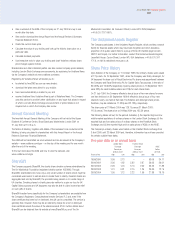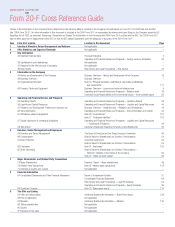Vodafone 2004 Annual Report Download - page 135
Download and view the complete annual report
Please find page 135 of the 2004 Vodafone annual report below. You can navigate through the pages in the report by either clicking on the pages listed below, or by using the keyword search tool below to find specific information within the annual report.
Annual Report 2004 Vodafone Group Plc
133
Material Contracts
At the date of this Annual Report, the Group is not party to any contracts that are
considered material to the Group’s results or operations, except for its $10.4 billion
credit facilities which are discussed under “Operating and Financial Review and
Prospects – Liquidity and Cash Resources”.
Exchange Controls
There are no UK government laws, decrees or regulations that restrict or affect the
export or import of capital, including but not limited to, foreign exchange controls on
remittance of dividends on the ordinary shares or on the conduct of the Group’s
operations, except as otherwise set out under “Taxation”.
Taxation
As this is a complex area, investors should consult their own tax adviser regarding the
US federal, state and local, the UK and other tax consequences of owning and
disposing of shares and ADSs in their particular circumstances, and in particular
whether they are eligible for the benefits of the Old Treaty and/or the New Treaty.
This section describes for a US holder (as defined below), in general terms, the
principal US federal income tax and UK tax consequences of owning shares or ADSs in
the Company as capital assets (for US and UK tax purposes). This section does not,
however, cover the tax consequences for members of certain classes of holders
subject to special rules and holders that, directly or indirectly, hold 10 per cent or
more of the Company’s voting stock.
A US holder is a beneficial owner of shares or ADSs that is for US federal income tax
purposes:
(i) a citizen or resident of the United States,
(ii) a US domestic corporation,
(iii) an estate the income of which is subject to US federal income tax regardless
of its source, or
(iv) a trust if a US court can exercise primary supervision over the trust’s
administration and one or more US persons are authorised to control all
substantial decisions of the trust.
This section is based on the Internal Revenue Code of 1986, as amended, its
legislative history, existing and proposed regulations thereunder, published rulings and
court decisions, and on the tax laws of the United Kingdom, all as currently in effect,
as well as on the Double Taxation Convention between the United States and the
United Kingdom entered into force in 1980 (the “Old Treaty”) and the Double Taxation
Convention between the United States and the United Kingdom that entered into force
in March 2003 (the “New Treaty”). These laws are subject to change, possibly on a
retroactive basis.
Generally, the New Treaty is effective in respect of taxes withheld at source if an
amount is paid or credited on or after 1 May 2003. Other provisions of the New Treaty,
however, took effect for UK purposes for individuals on 6 April 2003 (1 April 2003 for
UK companies) and took effect for US purposes on 1 January 2004. The rules of the
Old Treaty remained applicable until these effective dates. However, a taxpayer may
elect to have the Old Treaty apply in its entirety for a period of twelve months after the
applicable effective dates of the New Treaty.
This section is further based in part upon the representations of the Depositary and
assumes that each obligation in the Deposit Agreement and any related agreement
will be performed in accordance with its terms.
For purposes of the Old Treaty and the New Treaty and the US-UK double taxation
convention relating to estate and gift taxes (the “Estate Tax Convention”), and for US
federal income tax and UK tax purposes, a holder of ADRs evidencing ADSs will be
treated as the owner of the shares in the Company represented by those ADSs.
Generally, exchanges of shares for ADRs, and ADRs for shares, will not be subject to
US federal income tax or to UK tax, other than stamp duty or stamp duty reserve tax
(see the section on these taxes below).
Taxation of dividends
UK Taxation
Under current UK tax law, no withholding tax will be deducted from dividends paid by
the Company.
A shareholder that is a company resident for UK tax purposes in the United Kingdom
will not be taxable on a dividend it receives from the Company. A shareholder in the
Company who is an individual resident for UK tax purposes in the United Kingdom is
entitled, in calculating their liability to UK income tax, to a tax credit on cash dividends
paid on shares in the Company or ADSs, and the tax credit is equal to one-ninth of the
cash dividend.
Under the Old Treaty, a US holder was entitled to a tax credit from the UK Inland
Revenue equal to the amount of the tax credit available to a shareholder resident in
the United Kingdom (i.e. one-ninth of the dividend received) but the amount of the
dividend plus the amount of the tax credit were then subject to withholding in an
amount equal to the amount of the tax credit. A US holder, therefore, did not, in fact,
receive any repayment from the UK Inland Revenue in respect of a dividend from the
Company, although assuming the US holder was not resident in the United Kingdom
for UK tax purposes, there was no further UK tax to pay in respect of that dividend.
Under the New Treaty, a US holder is not entitled to a tax credit from the UK Inland
Revenue in the manner described above and dividends received by the US holder from
the Company are not subject to any withholding by the United Kingdom under the New
Treaty or otherwise.
US Federal Income Taxation
A US holder is subject to US federal income taxation on the gross amount of any
dividend paid by the Company out of its current or accumulated earnings and profits
(as determined for US federal income tax purposes). Dividends paid to a non-corporate
US holder in tax years beginning after 31 December 2002 and before 1 January 2009
that constitute qualified dividend income will be taxable to the holder at a maximum
tax rate of 15%, provided that the holder meets certain holding period requirements.
Dividends paid by the Company with respect to the shares or ADSs will generally be
qualified dividend income.
A US holder that is eligible and elects for the benefits of the Old Treaty may include in
the gross amount of income the UK tax withheld from the dividend payment pursuant
to the Old Treaty as described in “UK Taxation”. Subject to certain limitations, the UK
tax withheld in accordance with the Old Treaty and effectively paid over to the UK
Inland Revenue will be creditable against the US holder’s US federal income tax
liability, provided the US holder is eligible for the benefits of the Old Treaty and has
properly filed Internal Revenue Form 8833. Special rules apply in determining the
foreign tax credit limitation with respect to dividends that are subject to the maximum
15% tax rate.
Under the New Treaty, a US holder is not entitled to a UK tax credit payment, but is
also not subject to a UK withholding tax. The US holder includes in gross income for
US federal income tax purposes only the amount of the dividend actually received
from the Company, and the receipt of a dividend does not entitle the US holder to a
foreign tax credit.
In either case, dividends must be included in income when the US holder, in the case
of shares, or the Depositary, in the case of ADSs, actually or constructively receives
the dividend and will not be eligible for the dividends-received deduction generally
allowed to US corporations in respect of dividends received from other US





















